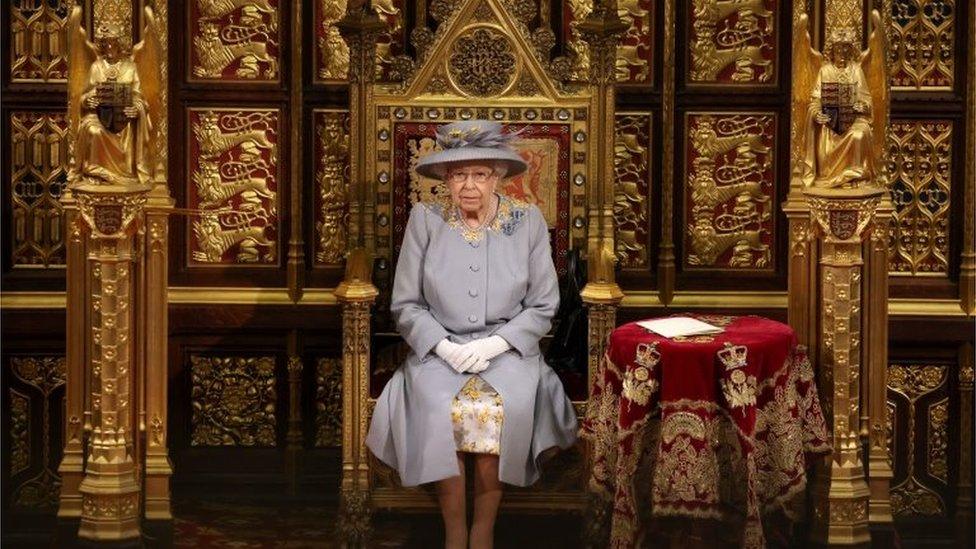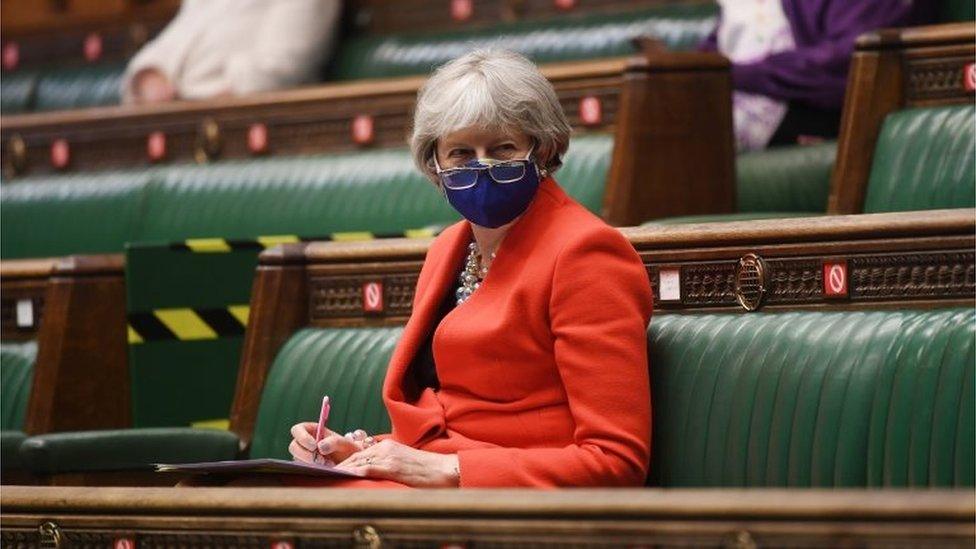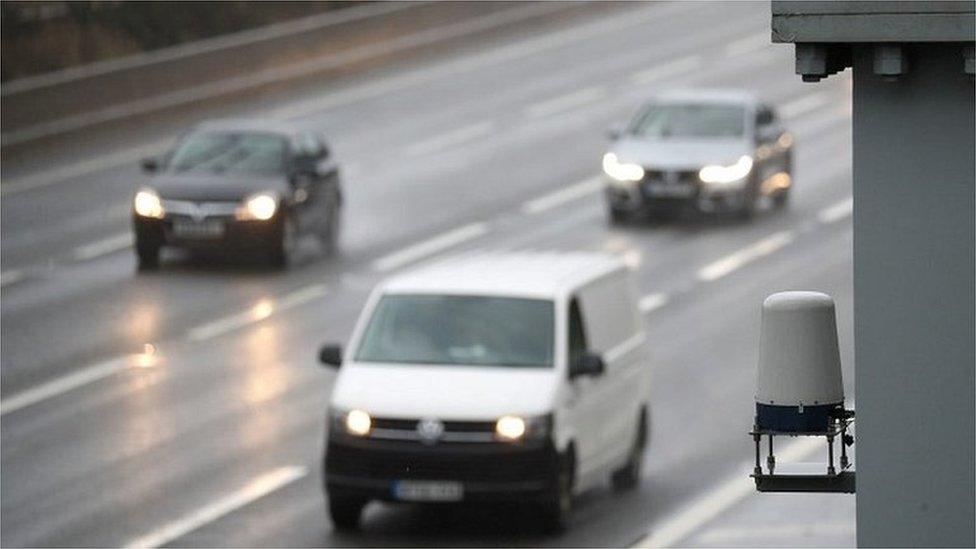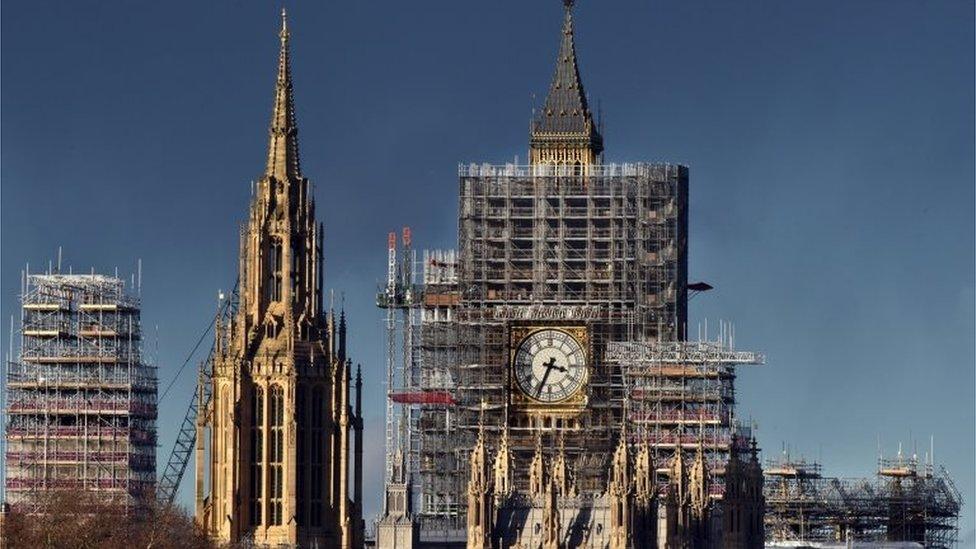The week ahead in Parliament
- Published

For the government the most worrying moments are when their own troops look unhappy - notably over planning reform in England, to speed up house building.
The former Prime Minister Theresa May was the first, but far from the last MP to signal their worries.
And there was also a well-choreographed operation led by former Chief Whip and International Development Secretary, Andrew Mitchell, which saw a parade of senior backbenchers - Damien Hinds, David Davis, Jeremy Wright and Theresa May (again) - calling for the government to restore the commitment for the UK to spend 0.7 per cent of Gross National Income on overseas aid.
And with former Defence Minister Johnny Mercer now lurking on the backbenches, promising to make the government's life difficult, if it fails to legislate to shield Northern Ireland veterans from historic prosecutions, there is a shoal of awkward issues for ministers to navigate.
None of these have shown up in amendments to the Queen's Speech, because attempting to amend your own government's programme is a pretty extreme step for a Conservative MP, but watch out for other, more targeted, forms of action.
But beyond the official amendments from Labour as the main opposition party and the SNP as the second-largest, there are a number of cross party amendments to the Queen's Speech being offered up for selection by Mr Speaker.
The Green MP Caroline Lucas leads on an amendment regretting insufficient measures in the speech to address the climate and ecological emergencies - especially the Climate and Ecological Emergency Bill she has been promoting.
The amendment has attracted support from Labour, SNP, SDLP and Plaid Cymru MPs, and calls on the government to make time for the CEE Bill to be debated and passed into law.
There's another amendment along similar lines from Labour's Zarah Sultana.
And Ms Sultana also has an amendment calling for the government to legislate on the ownership of Premiership and English Football League clubs, and introduce a German-style fan-ownership system with a People's Football Bill.
She argues the lesson of the European Super League fiasco is that the fans should have a bigger stake in clubs.

Theresa May expressed concern over the government's plans to speed up house building
The two SNP MPs who've switched to Alex Salmond's new party, Alba have an amendment regretting that the speech "does not adequately address the demonstrated will of the Scottish people" for independence, while former Labour front-bencher Richard Burgon leads on an amendment calling for higher taxes on the super-rich, including a 55% rate on incomes over £200,000.
One to watch may be the Labour MP Stella Creasey's amendment - one of the few to attract a Conservative signature (from former Cabinet Minister David Davis).
It says there should be a requirement for the government to act when the courts rule that a policy is incompatible with the human rights of a UK citizen, and notes that ministers have failed to address court rulings on, for example, the rights of children of unmarried parents, when one of the parents dies, and on victims of domestic violence.
The amendment calls for a measure to ensure such issues are dealt with within three months.
Elsewhere there a couple of significant internal debates - the Commons is discussing next moves on the long postponed Restoration and Renewal project on Thursday, while Their Lordships consider whether to return to pre-pandemic working methods.
Here's my rundown of the week ahead:
Monday 17 May

New SNP MP Anum Qaisar-Javed may take her seat on Monday
The Commons opens (14:30) with the first departmental question time of the new parliamentary year - Work and Pensions.
It is possible there may be some ministerial statements or urgent questions.
Then MPs turn to Day 4 of their debate on the Queen's Speech, where the theme of the day is safer streets for all.
Monday may also see the arrival of a new MP, Anum Qaisar-Javed, who held Airdrie and Shotts for the SNP, after the previous occupant, Neil Gray moved to Holyrood.
On the Committee Corridor, Lord Frost, the government's Brexit supremo is before the European Scrutiny Committee (14:30) to face questions on the Northern Ireland Protocol, the mechanism to avoid a 'hard border' with Ireland.
During his recent visit to Northern Ireland, Lord Frost said it was hard to see that the way the Protocol was operating could be "sustainable for long".
Public Accounts (14:30) is looking at the timeliness of local auditor reporting on local government in England, with another hearing on the same subject due on Thursday.
In the Lords (14:30) business begins with the introduction of the forensic anthropologist, Susan Black as Baroness Black of Strome. She will sit as a crossbencher.
Questions to ministers range across financial support for landmine clearance overseas, referrals for eating disorders and reforms to provide person-centred social care for dementia sufferers.
Then (assuming there are no statements or Private Notice Questions) peers continue their Queen's Speech debate, focusing on communities, welfare, transport and the environment, with (gulp) 67 speakers already listed.
Tuesday 18 May

MPs will hear evidence on concussion in sport
Commons business opens (11:30) with Justice Questions - followed by the fifth day of the Queen's Speech debate - where the theme will be affordable and safe housing for all and there will be a vote on one of the opposition amendments to the Loyal Address - a proposal to add polite regrets about the contents to the House's thanks to the Sovereign.
Committee action includes Digital, Culture, Media and Sport continuing its frequently harrowing inquiry into concussion in sport, (10:00) - witnesses include Professor Alistair Burns, the National Clinical Director for Dementia and Older People's Mental Health at NHS England and Dr Rod Jaques, Director of Medical Services at English Institute of Sport.
Science and Technology (10.00) taking expert evidence on the role of batteries and fuel cells in achieving net zero greenhouse gas emissions.
And Environment, Food and Rural Affairs (14:30) on moving animals across borders - which will touch on the government's promised animal welfare legislation.
There will be witnesses from the British Horseracing Authority World Horse Welfare and The Horse Trust, while International Development (14:30) has a session on UK aid to Pakistan.
In the Lords (12:00) there are questions to ministers on ending online right-to-work checks for UK nationals, the proportion of the UK electricity supply imported from Europe, and on rail electrification.
Then, peers continue their Queen's Speech debate - covering home affairs, justice and culture.
Wednesday 19 May

The AA, RAC and West Midlands Police will give evidence on the rollout of smart motorways
The Commons opens (11:30) with half an hour of Welsh questions, followed by the first Prime Minister's Questions of the new session.
Then comes the final day of the Queen's Speech debate, when the theme will be the NHS and social care. There will be more votes on opposition amendments.
Watch out for Mr Speaker's selection of amendments to see whether any propositions from the backbenches are put to a vote.
The day's committee hearings include Transport (09:30) looking at the rollout and safety of smart motorways - with witnesses from the AA, RAC, West Midlands Police and the Logistics Association.
Elsewhere, Home Affairs (09:30) has a hearing on police conduct, Work and Pensions (09:30) are quizzing minister Justin Tomlinson on the disability employment gap, Northern Ireland Affairs (10:00) hear from members of the loyalist community on the Northern Ireland Protocol and Education (10:00) look at left behind white children from disadvantaged backgrounds.
They will question chair of the Commission on Race and Ethnic Disparities Dr Tony Sewell on their 24 recommendations for action.
In the Lords (12:00) there are questions on insurance for care homes and decarbonising transport, before peers return to the Queen's Speech (day 5) where the focus will be on foreign affairs and defence.
Thursday 20 May

Just before the action starts, the annual private members bill ballot (it's more like a raffle, really) will be held in a committee room.
It gives the winners debating time on a Friday morning, for the legislation of their choice.
MPs who gain a high place in the ballot (I'll be writing more about the intricacies of this next week) can expect their phones to ring incessantly and the email accounts to be bombarded with entreaties from a thousand pressure groups, within minutes.
In the Commons Chamber, proceedings open (09:30) with 40 minutes of Digital Culture, Media and Sport questions, followed by questions to the Attorney General, and the Leader of the House's statement on forthcoming Commons business.
The main event is a general debate on "Restoration and Renewal" - the project to renovate Parliament's crumbling Victorian home.
It's being billed as an important opportunity for MPs to set out their views on what the works should look like.
This is all with the goal of the Sponsor Body better understanding what is needed to build the broadest possible consensus - which means an approach that has taxpayers front and centre.
MPs "need to be able to look their constituents in the eye on this," one government source told me.
In other words, this looks very like a softening-up operation, designed to replace the current scheme with a much smaller programme that minimises any exodus from the historic buildings.
Public Accounts (10:00) continue their look at the timeliness of local auditor reporting on local government in England with officials from the Ministry of Housing, Communities and Local Government.
And Scottish Affairs hearing (13:25) may be fun, not so much for the subject matter - the government's internal review of the mechanisms for dealing with the devolved administrations - but for any fallout from the previous week's spectacular public smackdown between the committee chair, the SNP's Pete Wishart, and the Scottish Conservative leader, Douglas Ross.
Maybe, in a very British way, they will try to pretend nothing happened.
In the Lords (12:00) ministers field questions on subsidies for electricity generated from biomass, and support for private sector tenants who've built up rent arrears during the pandemic.
The main debate is on "remote participation and the hybrid sittings of the House of Lords" - in other words, whether to revert back to normal pre-pandemic working methods, or keep at least some aspects of the virtual House.
Interestingly, for a not famously technophile house, there are quite a number of peers who do want to keep some online working - particularly for their committee system.
Neither House sits on Friday 21 May.
Most of the coming week's agenda has been devoted to the contents of the Queen's Speech - the government's new programme of law-making, for the coming parliamentary year - with all kinds of markers going down to signal outright opposition to, or intent to amend, much of its contents.
The opposition parties are, of course, against much of what the government proposes, but their opposition will only bite if they can enlist the support of forty plus government MPs, and on most issues they can have little hope of doing so.
